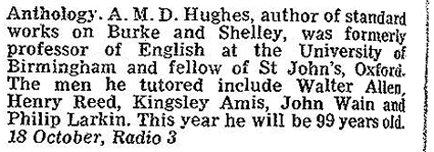I remember the poet, Henry Reed, telling me of a professor at Birmingham University, where Reed studied, who told him that he must correct his grammar before he could become a poet. Reed did so: Clare not only did not do so, but after some early attempts resolutely refused to comply.
[p. 11]
Henry Reed attended the University of Birmingham from 1931 until 1936. Who was this professor who taught him proper grammar and helped mould him into a modern poet? An answer appears in The Listener for September 28, 1972, in the schedule of upcoming radio programmes:

You can browse the rather daunting list of Hughes's books and publications on WorldCat. Anthony Thwaite, reviewing recent radio for The Listener on October 26, had this to say about the formidable professor's appearance:
The strangest and certainly most moving talk programme of the week was A.M.D. Hughes's Personal Anthology on Radio 3, which among other things demonstrated—in this period of celebration, when the supposed golden age of radio must often be sounding on tin ears—that old men do not forget. Hughes, approaching his 100th year (Radio Times got this right but R.D. Smith, introducing him on the air, managed to lop off a decade), used to teach English to, among other, the young Henry Reed and Kingsley Amis. He recited out of his blindness Hardy, Milton, Wordsworth, Arnold and Shelley, with an exalted and totally unfashionable inflection that demanded complete attention. He certainly got mine. For his performance of 'The Convergence of the Twain' alone this programme deserves a place in the archives, along with those crackling atmospheric fragments of Browning and Tennyson.
["Jabbering Set," p. 560]
Incidentally, R.D. "Reggie" Smith also would have been a student of Hughes's at Birmingham, along with Reed and Walter Allen. Arthur M.D. Hughes died on January 11, 1974. His obituary appeared in The Times, the following Monday:
Eric Robinson also mentions Reed in his acceptance speech for the Leonardo da Vinci Medal, given at the awards banquet of the annual meeting of the Society for the History of Technology in Las Vegas, in 2006:PROFESSOR A. M. D. HUGHESProfessor Arthur Montague D'Urban Hughes, Emeritus Professor of English at Birmingham University, died on Friday at the age of 100. He was widely known for his critical book The Nascent Mind of Shelley, published when he was 74.
Hughes was born at Worthing, Sussex, on November 3, 1873, the son of the Rev Edwin M. M. Hughes. He was educated at St Edmund's School, Canterbury, and St John's College, Oxford, and became a lecturer for Oxford's Extension Delegacy. He was English Lektor at Kiel University 1905-14 and a member of the staff of Oxford University Press 1915-21.
He was a lecturer in English at Birmingham from 1921 to 1931; and he lectured at St John's College, Oxford, from 1923 to 1929. He was appointed Reader in English at Birmingham in 1931 and Professor of English Language and Literature in 1935, retiring in 1939. He was made emeritus professor in 1940.
He married in 1906 Wilhemina Langenheim, of Kiel, Germany, and they had a daughter.[January 14, 1974, p. 14]
I began my life of archival research in the Birmingham City Reference Library at the age of eleven, when I went there in the evenings to do my homework. A happy, rotund lady called Miss Norris used to help me by bringing me books, but also manuscripts from the Boulton and Watt Collection. As a junior librarian (aged sixteen), she herself had compiled the first catalog of that great archive, and it was amazing what she could find in it. It's one thing to read about James Watt's engines, and another to look at the splendid colored drawings that Watt submitted in order to get a patent. A few years later, I was being taught at King Edward VI Grammar School in Aston, Birmingham, by the poet Henry Reed. He introduced me to the poetry of Auden. I read for the first time poetry whose visual images reinforced my own daily experiences...[.]
[Technology and Culture 48, no. 1 (2007): 133]
And so the circle of teaching is complete!







